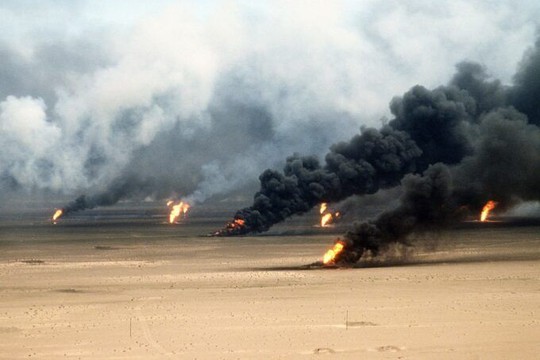Photo: Counter Punch
Twenty years ago, with President George W. Bush and Vice President Dick Cheney, two oil men and climate-change denialists, in the White House and new petroleum finds dwindling, it seemed like the most natural thing in the world for them to use the 9/11 horror as an excuse to commit “regime change” in Baghdad (which had no role in taking down the World Trade Center in New York and part of the Pentagon in Washington, D.C.).
They could thereby, they thought, create a friendly puppet regime and lift the U.S. and U.N. sanctions then in place on the export of Iraqi petroleum, imposed as a punishment for dictator Saddam Hussein’s 1990 invasion of Kuwait, ‘Counter Punch’ reminds.
There was a deep irony that haunted the decision to invade Iraq to (so to speak) liberate its oil exports. After all, burning gasoline in cars causes the earth to heat up, so the very black gold that both Saddam Hussein and George W. Bush coveted turned out to be a Pandora’s box of the worst sort. Remember, we now know that, in Washington’s “war on terror” in Iraq, Afghanistan, and elsewhere, the U.S. military emitted at least 400 million metric tons of heat-trapping carbon dioxide into the atmosphere. And mind you, that fit into a great tradition. Since the eighteenth century, the U.S. has put 400 billion — yes, billion! — metric tons of CO2 into that same atmosphere, or twice as much as any other country, which means it has a double responsibility to climate victims like those in Iraq.
The American war did direct harm to Iraq’s farmers, who make up 18% of the country’s labor force. And when it was over, they had to deal with staggering numbers of explosives left in the countryside, including landmines, unexploded ordnance, and improvised explosive devices, many of which have since been dangerously covered by desert sands as a climate-driven drought worsens.
An article in the journal of the Royal Swedish Academy of Sciences observes that when it comes to military disruptions of waterways, “Displacement, explosions, and movement of heavy equipment increase dust that then settles on rivers and accumulates in reservoirs.” Worse yet, between 2014 and 2018 when the guerrillas of the Islamic State of Iraq and the Levant, whom the American war helped bring into existence, took over parts of northern and western Iraq, they blew up dams and practiced scorched-earth tactics that did $600 million worth of damage to the country’s hydraulic infrastructure.
A little over half of Iraq’s farmed land relies on rain-fed agriculture, mostly in the north of the country. Iraqi journalist Sanar Hasan describes the impact of increasing drought and water scarcity in the northern province of Ninewah, where yields have shrunk considerably. Ninewah produced 5 million metric tons of wheat in 2020 but only 3.37 million in 2021 before plummeting by more than 50% to 1.34 million in 2022.
Thousands of Iraqi farming families are being forced off their lands by water shortages. For example, Hasan quotes Yashue Yohanna, a Christian who worked all his life in agriculture but now can’t make ends meet, as saying, “When I leave the farm, what do you expect me to do next? I’m an old man. How will I afford the cost of living?”
Worse yet, southern Iraq’s marshlands are turning into classic dust bowls. The Environment Director of Maysan Governorate in southern Iraq recently announced that its al-Awda Marsh was 100% dried up.
The marshes at the confluence of the Tigris and Euphrates rivers have been storied for thousands of years. The world’s oldest epic, the Mesopotamian tale of Gilgamesh, is set there as it describes a hero journeying to an enchanted garden of the gods in search of immortality. (Echoes of that epic can be found in the biblical story of the garden of Eden.)
Our addiction to fossil fuels, however, has contributed significantly to the blighting of that very source of life and legend.
Journalist Ahmed Saeed and his colleagues at Reuters quote Hasan Moussa, a former fisherman who now drives a taxi, as saying, “The drought ended our future. We have no hope, other than for a [government] job, which would be enough. Other work doesn’t fulfill our needs.”
Last fall, the International Organization for Migration at the United Nations estimated that 62,000 Iraqis living in the center and the south of the country had been displaced from their homes by drought over the previous four years and anticipated that many more would follow. Just as people from Oklahoma fled to California in droves during the Dust Bowl of the 1930s, so now Iraqis are facing the prospect of dealing with their own dustbowl. It is, however, unlikely to be a mere episode like the American one. Instead, it looms as the long-term fate of their country.
If, instead of invading Iraq, the American government had swung into action in the spring of 2003 to cut carbon dioxide output, as one of our foremost climate scientists, Michael Mann, was suggesting at the time, the emission of hundreds of billions of tons of CO2 might have been avoided. Humanity would have had an extra two decades to make the transition to a zero-carbon world. In the end, after all, the stakes are as high for Americans as they are for Iraqis.
At that point, in short, we would have invaded ourselves, confesses ‘Counter Punch’.
read more in our Telegram-channel https://t.me/The_International_Affairs

 11:13 28.07.2023 •
11:13 28.07.2023 •























